The first of two articles on Jewish life in war-torn eastern Ukraine.
For the first time in two decades, no public Chanukah celebration took place this year in the center of Donetsk, Ukraine. Gone was the towering menorah on Pushkin Boulevard surrounded by thousands of men, women and children from the city’s Jewish community; in its stead was the echo of artillery fire, fear and darkness.
Yet in a way, the Donetsk Jewish community marked this Chanukah on an even larger scale than usual. In Donetsk, which serves as the capital of the self-proclaimed separatist Donetsk People’s Republic, 400 people emerged from their homes to gather in the warmth of the city’s Jewish community center to celebrate, a large menorah illuminating the social hall. Some 700 kilometers away in Kiev, multiple Chanukah events for internally displaced families—in addition to a Shabbaton—were held, drawing the exiled Jews of Donetsk to their community’s temporary focal point. And in Israel, Donetsk Chanukah celebrations in Karmiel, Holon and Ashdod assembled together those who have made the difficult decision to begin their life anew in the Jewish homeland.
“It was a very emotional Chanukah for all of us,” states Rabbi Pinchas Vishedski, who, as co-director of Chabad-Lubavitch of Donetsk and the eastern city’s chief rabbi, has struggled to hold his community together through months of unexpected war. “We are no longer a community connected to one city; we are a community spread out in many cities around the world. This is obviously a great challenge.”
A video posted to the Jewish community’s website illustrates Vishedski’s words, with community members sending emotional Chanukah well-wishes to their hometown neighbors and friends from places as far-flung as Lawrence, Kan.; New York City; Lod, Israel; and Magdeburg, Germany.
“I wish that next year we can once again light the candles like we always did on Pushkin Boulevard,” says a young woman sitting in a public square directly to the camera. “Chag Chanukah Sameach from Warsaw!” she adds, before igniting two candles on a small silver menorah she had brought with her.
Despite the difficult circumstances, Vishedski and his wife, Dina, who have been Chabad emissaries to Donetsk since 1993, have continued their work unabated. With a full staff operating out of an office in the center of Kiev, the Vishedskis’ activities have only increased as they continue to direct their Jewish center in Donetsk, while simultaneously coordinating help—both material and spiritual—for thousands of Donetsk Jewish refugees around the world.

A Thing of the Past
Donetsk is the capital of the industrial Donbass region that comprises much of separatist-controlled eastern Ukraine. Until recently, it served as a major economic and scientific hub in the country, and was home to 1 million inhabitants. Its Jewish community, too, was the largest in the region, with an Or Avner Jewish school system, Beth Menachem synagogue, community center and soup kitchen.
Today, Donetsk is governed by internationally unrecognized pro-Russian rebels and remains under heavy fire. Nevertheless, because of its prewar size, industry and influence, many of its citizens have stayed, and many of those who had left during the summer months have returned. They hope they can somehow manage to hold on to their homes, jobs and possessions, and one day again live in a peaceful and flourishing city.
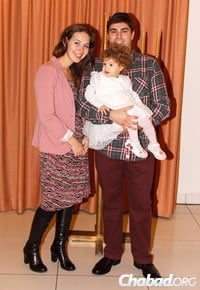
“We spent the month of August in Zaporizhia, but then we came back home,” explains Malka, a pensioner who lives with her husband in Donetsk, and whose two sons have left for Israel. “We wanted to be with our friends, our home, our community. This is where our roots are.”
Daily life in Donetsk is hard; each day, 250 Jewish community members show up at the community center’s kitchen to receive what may well be their one hot meal of the day. More than 12,000 meals have been served to date. “Many of them eat their meals there; others take more food home for dinner or give food to family members who can’t come themselves,” Nadiya Goncharuk, of the Donetsk Jewish community, writes in an email. “When we started this project, we saw people who were starving for weeks.”
During this unprecedented crisis, one of the most vital sources of help for Ukraine’s Jewish community has been the International Fellowship of Christians and Jews, headed by Rabbi Yechiel Eckstein, which thus far has allocated millions of dollars of funding for emergency relief. Much-needed support has similarly come from Or Avner, the Rohr Family Foundation and the Meromim Fund.
Still, with Ukraine’s currency continuing to plummet and the corresponding destruction of Ukraine’s previously emerging upper-middle class, financial stability for the Donetsk Jewish community has become a thing of the past.
“Our center and synagogue in Donetsk continues to work every day—nothing has stopped,” says Dina Vishedski. “Of course, now we have the additional expenses and responsibility to run programs in Kiev, where everything is much more expensive than Donetsk ever was, and in Israel, too. Our work here has in no way ended; it has just changed.”

‘You Just Get Used to It’
While the plight of Donetsk no longer makes international headlines, heavy fighting continues in and around the city and its environs. Parents have lost children, and children their parents. Blood soaks the Donbass, and as the harshness of winter takes root, no end to the violence remains in sight.
“It’s frightening to live here,” explains Malka by phone from Donetsk. “You hear explosions every day; the shooting rattles all the windows. All we can do is say psalms and pray that we should survive. Where can you turn? Only to G‑d.
“All of us who live here, we don’t think about it anymore. A person’s nature is to acclimate. So if you’re outside and you hear shooting, you stop, listen, if you see it’s over, you continue on your way. You just get used to it. It goes to show you how we can become used to anything.”
Nevertheless, Malka describes a Jewish community that continues to gather regularly to celebrate and support one another. “We miss the rabbi and Dina very much, but they continue to help us and provide for us, even if it now through Skype. They are still here for us, and we are thankful to them from the bottom of our hearts.

“We come together each Shabbat and for the holidays, like Chanukah, and when we walk into the synagogue, you forget the war. Inside, there is no war; there is only joy and hope and happiness,” says Malka. “We’re together, and this has all brought our community even closer together. If you would have seen the social hall on Chanukah, you would not have known there was a war outside.”
Each Shabbat, Malka and her husband walk an hour to the synagogue in Donetsk’s center. “We are not afraid that something will happen to us. We both feel safe, and if we’re walking to synagogue, G‑d will protect us,” she believes. “When we get back home, as night sets in, that’s usually when you hear fighting begin again. There is a saying: ‘If you will protect Shabbat, Shabbat will protect you.’ I believe that.”
Back in Kiev ...
Chanukah in Kiev? The Vishedskis could never have imagined it. After two decades, Donetsk’s Chanukah festivities had become legendary, an event that drew even those Jews who didn’t otherwise participate in community activities. Fireworks, flags, doughnuts, dancing—it was the event no one wanted to miss. And this year, everyone missed it.
“This year was a very difficult one for us,” laments Rabbi Vishedski. “The feeling for me and for my wife, it weighed down upon our souls. After 20 years, your plans for Chanukah, for everything … they’re all forced to change.”
Traditionally in Donetsk, Chanukah celebrations began three weeks before the holiday itself, with the office preparing and sending out thousands of menorah and candle kits to its members. This year was no different, except that the shipments were made from Kiev and were now sent around the world.
Then, on Chanukah itself, two events for Donetsk refugees were held in Kiev—one for kids in a science museum, and the other for families at an entertainment venue.

Additionally, a Shabbaton brought more than 150 people together for one memorable Shabbat—the majority of them from Donetsk, but also including a representation of Jews from Lugansk, the further-east city that has suffered great devastation as a result of the war. In addition to Vishedski and Lugansk’s Rabbi Sholom Gopin, and their families, guests included Eckstein of the International Fellowship and Israeli Minister of Immigrant Absorption Sofa Landver.
“It was a beautiful Shabbos together,” relates Vishedski. “People from our community came together from various cities for the first time in two months, and they sat together from the beginning until the end. It was something very special, both materially and spiritually. We did not want to be in this situation. But, thank G‑d, even in this difficult period, we were able to make Chanukah.”
Before the war, Donetsk had 13 emissary families involved with various parts of the Jewish community. Today, three families are working alongside the Vishedskis in Kiev, the rest having temporarily relocated to Israel.
“Most of them are in Israel, and they are planning to live there until the situation has changed,” says Vishedski, whose family itself has been uprooted from their home, and is now living in an apartment in Kiev. “We are, of course, trying to help them however we can, but this is emotionally a very difficult crisis for all of us. They made plans to live on shlichus forever; they now have many children and are settled; and their plans have suddenly been forced to change. It is impossible to explain how difficult this is for them.”

For most of the families, their apartments and homes in Donetsk were all they had. Now they are squeezing in together with family and friends, or in rented apartments, not knowing whether they should again invest in all the regular comforts of home that they already possess elsewhere.
“How long can this all continue?” Malka asks, repeating the question. “I can’t answer that, only G‑d knows. The Jewish people know about miracles; we’ve had so many in our history. That’s what we need now.”
Next: Refugees Themselves, Chabad Emissaries in East Ukraine Maneuver Dangerous Territory
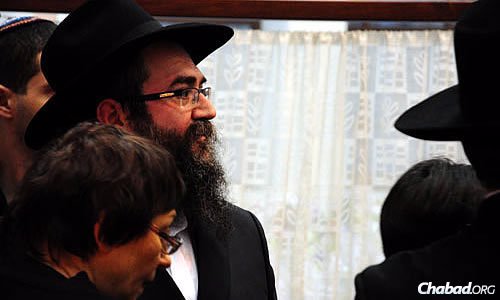
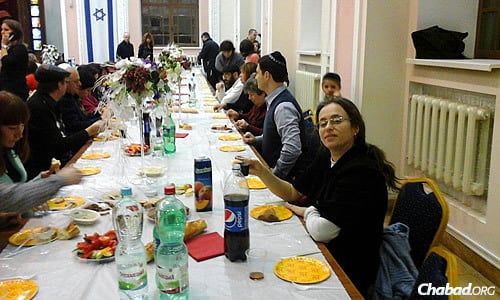
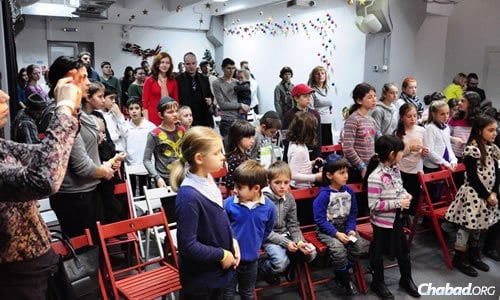
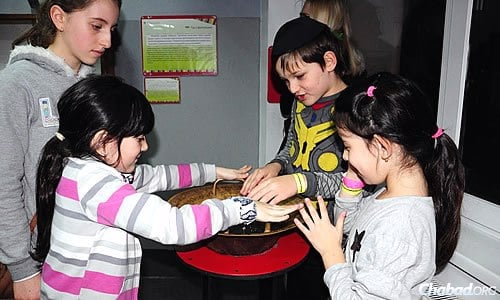



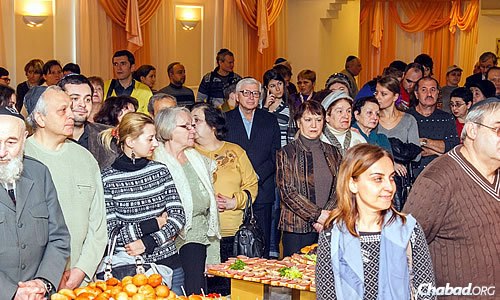
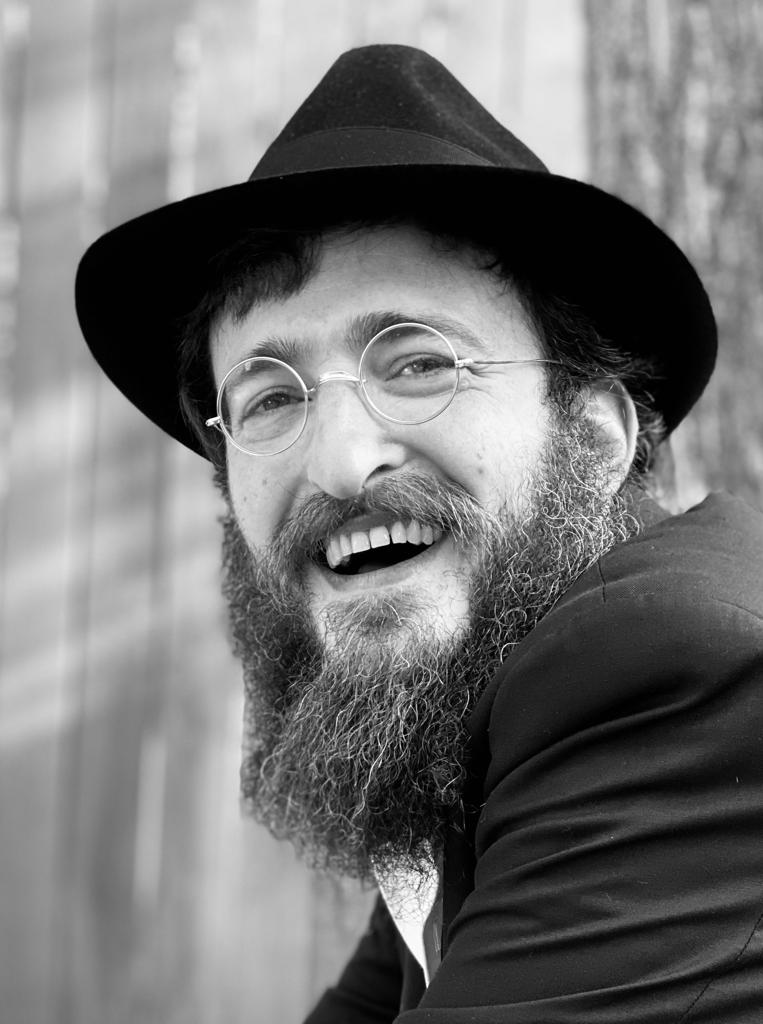

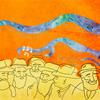




Join the Discussion